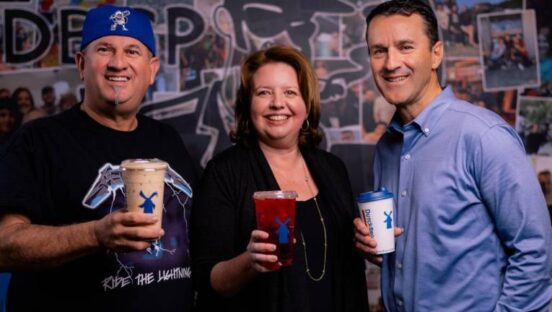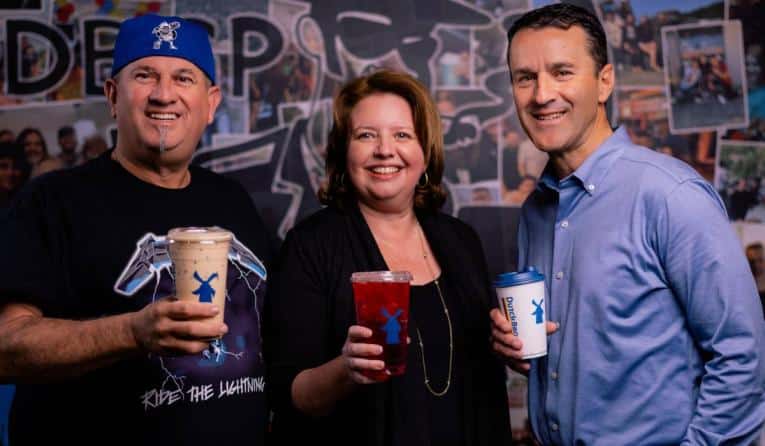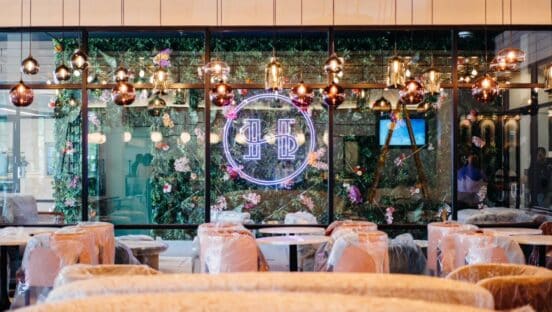On September 15, 2021, Dutch Bros cofounder and executive chairman Trav Boersma stood center stage on the floor of the New York Stock Exchange, donning sunglasses and a “Rage Against the Machine” T-shirt—emblematic of his company’s rebellious beginnings.
With a gavel in his right hand, Trav used his left to count down and prepare a chant. He and the team surrounding him shouted “DUTCH” while the crowd responded “BROS.” Shortly after, he reared back the gavel well above his head and smashed it against the sound block four times. He then lifted the gavel straight into the air and turned to both sides, making sure everyone understood the gravity of the moment. Judging by the smiles, claps, yells, and cheers, it was clear they did.
Dutch Bros was now a public company, marking one of the chain’s greatest achievements.
CEO Joth Ricci, who stood behind Trav, recalls Wall Street as an “eye-opening” experience, and one that he couldn’t be more proud of. The celebration wasn’t restricted to top brass either. Dutch Bros brought about 100 team members to the New York Stock Exchange, many of whom had never been to the Big Apple. It was an opportunity to not only share a special occasion with employees but to allow them to witness a different side of the business.
It was representative of a culture that hadn’t waned in three decades.
“To be with Trav and his family and to celebrate the event with them, and to really have respect for the 30-year journey basically that the family had been on to get to this point and to have them see this brand that they started and that they cultivated and they loved, to be able to be put on really the national—if not the global—stage of going public was really great,” Ricci says. “And to watch Trav ring the bell was a moment in my career that I will never forget.”
Humble Beginnings
In 1992, 21-year-old Trav and his 38-year-old brother Dane were in different places in life. Dane was a father of three, while Trav was “footloose and fancy-free,” he says.
They were third-generation dairy farmers in Oregon facing new mandates that would’ve required $150,000 worth of investment. The two were hardly paying the bills as it was.
When it came time to sell the herd, Dane was left at a crossroads. He earned in the neighborhood of $50,000 to $60,000 from the sale and lived a frugal life, but he wanted to make sure his kids could get Air Jordans or make trips to Disneyland. Dane considered getting a job at Walmart or West Coast-based grocery chain, Fred Meyer.
“I was like, ‘Hold up. What? You can’t go do that,’” Trav says. “‘I mean we’ve had all these ideas man. I mean we should at least explore one of them, see what happens.’”
At the time, Trav routinely drank vanilla lattes and suggested they open an espresso cart. To which Dane responded, “what’s an espresso?”
So Trav took him to a local drive-thru called Western Expresso, run by a “hokey, but super smiley” woman who was barefoot and knew customers by name. Dane received his drink first, and Trav couldn’t have asked for a better reaction.
“I look over and he’s licking the milk foam off,” Trav says. “This is unbelievable. I’m like, ‘That’s what I’m talking about dude.’ And so I got mine and we started talking about it. We just dove in.”
In search of an equipment supplier, the brothers drove through the I-5 corridor jamming to the Beatles, Led Zeppelin, Jimi Hendrix, Cream, and Chicago. They stopped in Portland to meet with Boyd’s Coffee, but the pitch sounded too similar to a used car salesman. Trav and Dane then met with a company in Seattle that showed promise, but the true prize came in Eugene, Oregon, when they met Paul Leighton—a future mentor and friend. He taught the brothers how to pull shots, steam milk, and make cappuccinos, and provided them with several coffee varietals to play with.
Now fully supplied, they invited friends and family to serve as guinea pigs for their budding espresso business.
“It was some of the best times ever as I look back on them, man,” Trav says.
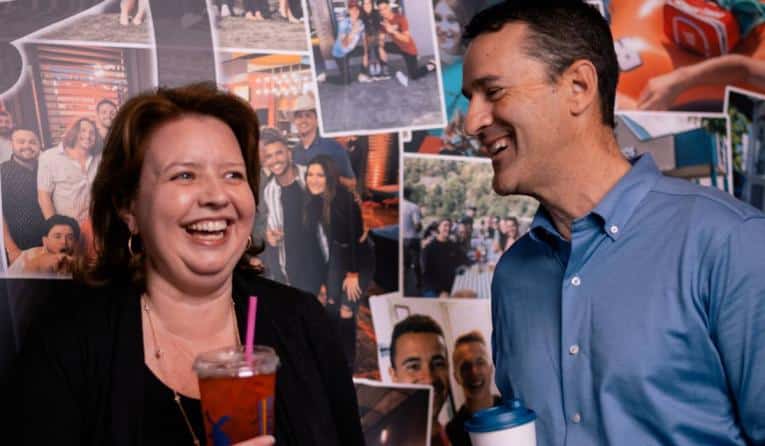
“As I tell people, we’re not a real estate company plugging people into it,” CEO Joth Ricci (right) says. “We’re a people company plugging real estate into it.”
At this point, Dane’s expertise became paramount. He owned a Dairy Queen franchise at 22 years old and understood the importance of speed, simplicity, and how to put together a menu. Perfecting the mocha was crucial. It was the early 90s and espresso was not well known, especially not in Grants Pass, Oregon, where the two were looking to plant their first flag. They were tasked with educating others. The siblings tested Mrs. Richardson’s Hot Fudge, Nestlé Quik, Hersey’s syrup, and Guittard Chocolate—everything one could imagine, Trav says. They settled on chocolate milk from down the street, and it proved to be the game-changer.
“We thought, well, this is a slam dunk,” Trav says. “It’s going to be easy.”
The menu began with a Double Dutch Mocha and Single Dutch Mocha. The price was $1.25 for an 8-ounce drink and $1.75 for 12 ounces. Following the lead of other coffee carts, Trav and Dane hoped to open their first station at Fred Meyer.
They were hyped after applying. A week passed, and there was no phone call. Silence remained after two, then three weeks. So finally Trav called. The store confirmed it received the application and asked the brothers to be patient. A few more weeks flew by, and Trav decided to call again. This time, the response was more snarky. Trav told Fred Meyer about how anxious he and his brother were and that they were ready to go. The store official, not moved, said, “Yeah, well, we’re not ready to go and when we are, we’ll let you know.”
In light of that debacle, Trav and Dane searched for another site and found one in downtown Grants Pass on 6th Street near the U.S. Post Office. The brothers sealed an agreement with the landlord for $150 per month. They were positioned beside an old billboard sign with power outlets, a convenient spot to plug in a grinder and refrigerator.
The Dutch Bros team was set, but nervous—at least one of them was.
“I remember Dane tripping on the first day, like, ‘I don’t know if I can do it, man. This just feels too weird,’” Trav says. “We had a little building behind us that we had set up as our backdrop and our storage facility that we could roll the cart into and lock everything up at night. And he stood back there and I go, ‘Hey dude, I’m gonna make you a mocha and I’m gonna put on some Led Zeppelin and we’ll start rolling here.’”
The pushcart earned around $65 that first day. Trav and Dane were indeed rolling, until the store manager of Grocery Outlet—which shared a parking lot with a strip mall and the cart—directed all of his ire toward the brothers. Full of not-so-nice profanities, the Grocery Outlet representative demanded they leave.
“‘I don’t give a f*** who you talked to,’” says Trav, recalling the unadulterated rage from the store manager. “‘This is my parking lot, and I’m gonna move your sh** unless it’s out of here tomorrow. Is that clear? and I’ll do it with my forklift if I’ve got to.’ And I’m like, ‘OK, we don’t want any problems.’ And he’s like, ‘Yeah me either so beat it out of here.’ It’s just like hardcore.”
Undeterred, the brothers returned the next day, making the store manager even angrier. This time, Trav followed him into his office and convinced him to let the pushcart stay for 30 days as an experiment. During one of those days, some of Grocery Outlet’s corporate leadership pulled into the parking lot. One lit up a cigarette, another ordered a cappuccino, and a third received a mocha. Trav and Dane set the tone by offering the beverages for free. The group enjoyed their drinks so much that they praised the store for allowing the pushcart to be in the parking lot.
Thus, Dutch Bros was born—for real this time. A couple of years later, the company opened its first drive-thru. Expansion continued from there. The concept opened its first franchise in 2000. In 2005, Dane was diagnosed with ALS, at which point Trav strapped the business on his back and carried it forward. The biggest change came in 2008 when the chain decided to stop selling franchises to operators who didn’t grow up in the company. They were good people, Trav says, but they just didn’t understand the culture.
Dane passed away in 2009, and the brand honored his legacy by pushing past the Great Recession and kickstarting a new, successful growth path. In 2017, Dutch Bros shut off franchising completely so it could be the sole judge of getting “the best of the best” people in its system.
Dutch Bros is expected to earn $1 billion in revenue on a trailing 12-month basis in late 2023.
“Then we could build a pipeline of people and a ladder for them to climb and pay them extraordinarily well and they could build their teams and do leadership development and cultivate culture like nobody’s business,” Trav says. “That people system that we developed I think is one of the best things that we’ve ever done.”
Meteoric Rise
Dutch Bros ended 2022 with 671 shops, making it the third-largest coffee chain in the U.S. in terms of unit count, only trailing Dunkin’ and Starbucks. The brand debuted a record 45 stores systemwide in Q1, pushing the systemwide total to 716 shops across 14 states. AUV for corporate stores open since 2019 were $2 million, 20 percent higher than units coming online prior to 2019.
In 2023, the brand plans to open 150 stores. That would put the company past 800 units, a goal it set back in 2018 when it received an investment from TSG Consumer Partners. Dutch Bros is also expected to earn $1 billion in revenue on a trailing 12-month basis in late 2023 and surpass 1,000 restaurants by 2025.
Ricci is often asked how Dutch Bros scales culture from Boise, Idaho, to El Paso, Texas, and Knoxville, Tennessee. The company does this through an internal development model in which a team member can’t run a Dutch Bros in a new market without being part of the brand for a long time. He estimates that on average, it takes seven to nine years for people to get promoted into a trade area. Growth is predicated on the availability of talent. The pipeline has to be strong because when Dutch Bros enters a new market, it opens multiple stores as part of an overall fortressing strategy.
At the start of 2023, there were roughly 275 people in the pipeline ready to build new trade areas.
“As I tell people, we’re not a real estate company plugging people into it,” Ricci says. “We’re a people company plugging real estate into it. … We’re taking the best of the best of the leaders that we have currently in the system and then we’re moving them in to basically create what people view is so special with Dutch.”
Valuing experience starts at the top. In February, Christine Barone, formerly the CEO of True Food Kitchen and an executive with Starbucks, joined the company as president. She’s tasked with leading operations and leveraging her knowledge of coffee, service industries, and digital marketing. Her first impression: everyone on the leadership team is genuine, and that carries throughout the organization.
She views Dutch Bros as a company that recognizes employees want to work in places where they can have fun, make connections with colleagues, and go home in a good mood.
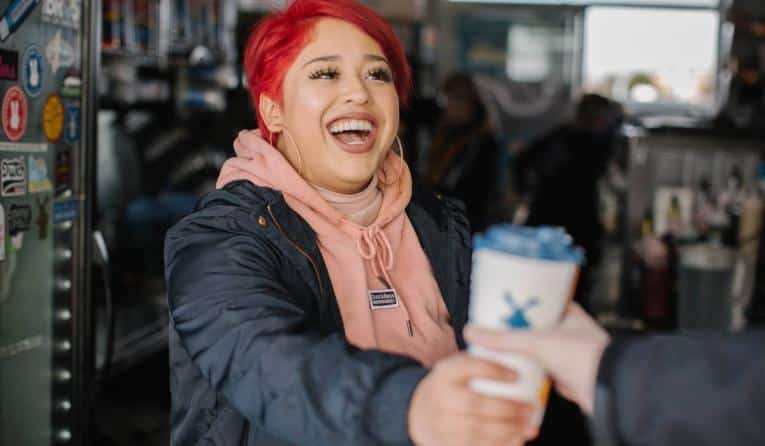
In 2021, the company launched its first loyalty program, called Dutch Rewards.
“It felt to me like Dutch Bros really just was getting a lot of things incredibly right,” Barone says. “And I also have three teenagers, and so they think I’m very cool now and that was an exciting part of the journey of joining Dutch as well.”
In Q4, shop-level turnover improved about 3 percent quarter-over-year and sat in the mid-70 percent range. Manager turnover was in the low double digits and operator turnover was basically nonexistent. In 2022, the chain promoted more than 2,500 workers in the field, up from 1,700 in 2021. And on January 1, Dutch Bros increased wages across all jurisdictions that rely on the federal minimum wage as their standard.
In Barone’s short time with the brand, she’s watched decisions being made through the lens of the broista (Dutch Bros’ play on words for barista). How will they feel about this? How will this look inside the shop? How do we make time to understand the hopes and dreams of people on our team?
“Taking the time to really listen and understand where someone’s coming from—it feels like that’s throughout the organization,” Barone says. “So to me it’s the special sauce that’s hard to put your finger on exactly what it is, but it’s absolutely a feeling that you get everywhere from the shop window, up into the headquarters of Grants Pass.”
The same care is given to customers. In 2021, the company launched its first loyalty program, called Dutch Rewards. By Q4 2022, 64 percent of transactions came from rewards members, and there’s room to expand that further in newer stores. Locations open since 2019 have roughly 5 percent lower rewards penetration than restaurants opening before 2019.
Within the loyalty program is Dutch Pass, a feature that allows users to pre-load funds and pay through the app. The benefit is twofold—customers are offered a contactless form of payment and drive-thru speeds improve. In the fourth quarter, Dutch Bros promoted the Dutch Pass, which doubled the daily average of loads. “I think as we look at the loyalty program, it’s really about understanding our guest more and our customers more and what do they want from us,” Barone says. “And so part of that program I think is just learning more about the habits and what people like and helping them understand, well, if you’re someone who really likes to try a lot of different drinks, here’s something you might want to try next and how can we help you do that.”
More than 80 percent of the menu is cold beverages. Dutch Bros’ proprietary energy drink, Blue Rebel, is 27 percent of net sales and helps anchor afternoon and evening dayparts. In the rolling 12 months through Q3, net sales distributed pretty evenly throughout the day: 10 a.m.-3 p.m., 37 percent; before 10 a.m., 27 percent; 3 p.m.-8 p.m., 27 percent; and after 8 p.m., 9 percent.
This year, the brand is testing tap systems that will dispense cold brew and Blue Rebel, which should increase throughput and significantly reduce waste throughout the company’s distribution system.
Dutch Bros is a beverage-led concept in every sense of the word. There are a handful of food items, and Ricci doesn’t expect it to ever become more than that. The chain tested breakfast burritos a few years ago, but they didn’t hold up to company standards.
“I think Trav said it best, he said, ‘So what’s special about opening up plastic wrap around the burrito that was heated in a TurboChef?” Ricci says. “‘How does that make the experience any better?’”
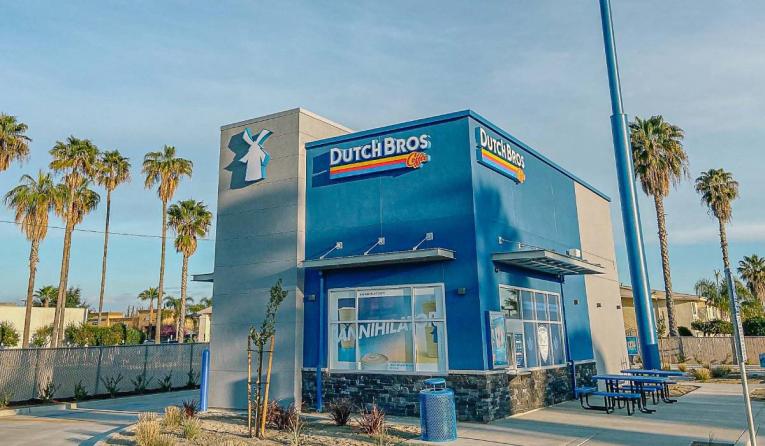
Dutch Bros is on the road to 4,000 stores.
What Lies Ahead
In the next 10–15 years, Dutch Bros wants to break 4,000 locations.
It’s not a baseless prediction, Ricci says. That came from scientific modeling, and the company only kept to promised geographies. The brand uses a smiley face growth strategy where it seeks expansion along the mouth of the smile. Meaning from the Pacific Northwest, California, and the Southwest to the Southeast and Mid-Atlantic. Tennessee was the first state on the East Coast to welcome Dutch Bros. It will be followed by Kentucky and Alabama in 2023 and Florida sometime in 2024.
“I believe the beverage concept is a very scalable concept,” Ricci says. “And just about everywhere you go throughout the country, it is very different from food, where food becomes more regionally based and more regional in how people consume it. Beverage has a much broader base of consumption across big categories.”
It wasn’t always like this. Amid the IPO process, Ricci spent a great deal of time explaining to people what Dutch Bros is and where Grants Pass is located on the map. Not many had heard of it. But during a media tour he conducted after the company’s Q3 2022 earnings call, every interview ended with, “When are you coming to New Jersey?” “Can I get the rights to Long Island?” “How fast will it take to get there?”
Ricci says it’s a testament to what the brand has earned. But Dutch Bros isn’t heading into the Great Lakes or the Northeast. It’ll most likely go as far north as Southern Virginia, according to today’s roadmap.
More attention doesn’t mean a change in plans. The culture is stronger than that.
“I would say that a lot of other people who we work with every day now are just like, ‘Hey bring this to New York, it would be great,’” Ricci says. “But we’ll stay disciplined to what we want to do.”

